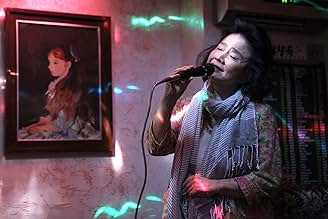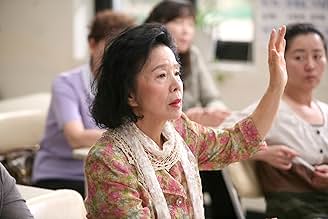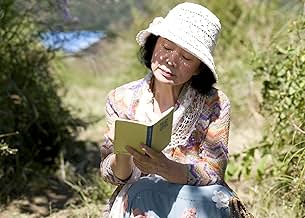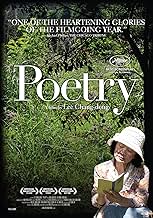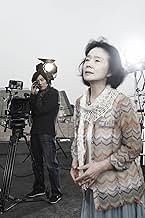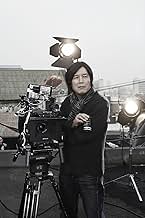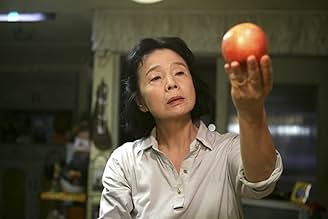A sixty-something woman, faced with the discovery of a heinous family crime and in the early stages of Alzheimer's disease, finds strength and purpose when she enrolls in a poetry class.A sixty-something woman, faced with the discovery of a heinous family crime and in the early stages of Alzheimer's disease, finds strength and purpose when she enrolls in a poetry class.A sixty-something woman, faced with the discovery of a heinous family crime and in the early stages of Alzheimer's disease, finds strength and purpose when she enrolls in a poetry class.
- Awards
- 27 wins & 25 nominations total
- Director
- Writer
- All cast & crew
- Production, box office & more at IMDbPro
7.814.5K
1
2
3
4
5
6
7
8
9
10
Featured reviews
A poet and she didn't know it
It never ceases to amaze me how Korean film makers seem capable of balancing so much in their films - so many of the best films from Korea seem to defy any genre categorizations. They are often funny when you expect them to be horrifying, thrilling when you expect them to be ethereal, and have a way of turning all audience expectations upside down.
Poetry is one of the very best Korean films of the last few years. I saw it last week, and still can't get that wonderful old lady out of my head. It is, very briefly, about a proud but desperately poor woman in her mid-60's, who looks after her taciturn teenage grandson, who finds out that he may have been involved in the rape of a girl who later commits suicide. Simultaneously, she is diagnosed with early Alzheimers disease. She is also trying to find an artistic outlet, to make some mark on the world before she loses her grip. All these elements come together in a way with is somethings horrifying, sometimes fascinating, and ultimately very beautiful.
This film is a flat out masterpiece and demands to be seen.
Poetry is one of the very best Korean films of the last few years. I saw it last week, and still can't get that wonderful old lady out of my head. It is, very briefly, about a proud but desperately poor woman in her mid-60's, who looks after her taciturn teenage grandson, who finds out that he may have been involved in the rape of a girl who later commits suicide. Simultaneously, she is diagnosed with early Alzheimers disease. She is also trying to find an artistic outlet, to make some mark on the world before she loses her grip. All these elements come together in a way with is somethings horrifying, sometimes fascinating, and ultimately very beautiful.
This film is a flat out masterpiece and demands to be seen.
Looking for the poetry in life
What a wonderful film! To give my personal answer to one interviewer's question "Do you regard cinema, too, to be a dying form?" to the director Lee Chang-Dong. I believe (and deeply hope) that as long as films like Poetry are being made cinema will continue to flourish because it is important. It will continue to exist as long as humans exist because they are about being human. I was struck by how masterfully two sides of our humanness were presented in the film. On the one hand, it is about our search for beauty, as beauty can only be experienced if something of our own potential beauty responds to the beauty around us. There is something spiritual in this as Beauty and Truth are essentially one. On the other hand, there is the human predicament. That includes the pro and cons of the fact that we always have the choice to decide if we act ethically or not. That means if we actually say Yes to what is intrinsically our positive potential, or we say No and harm others, our environment and as a kind of end result, ourselves. What for me links the two is impermanence. Old age, illness and suicide as it is shown in the film. "Everything that is born will have to die" goes a very old Buddhist saying, and that happens no matter if we like it or not. At the same time, would we experience beauty if everything was to exist forever? Is it not because a beautiful flower grows out of a very simple looking seed in spring and then withers away after some weeks that it can become so precious to us? Without impermanence there is, one could say, by definition no beauty. Both are somehow the two sides of the same metaphorical coin. The same is true about this film. It still lingers on in my heart and mind weeks after I saw it. Very much like a true and wonderful poem, for example Rainer Maria Rilke's First Duino Elegy. It is is just about that, the wonder and horror of beauty.
subtle and beautiful
Lee Chang Dong has always been a favorite Korean director of mine. His films, including "Poetry," have a subtle yet captivating force. "Poetry" is not for the average film viewer, but is for more mature audiences who are not afraid to confront life as it is and the existential aspects of life in general. The film is an exploration of complex human conditions that people can often find boring. But "Poetry" is inarguably meaningful and deep in its own way. It presents life realistically, but also paves way for finding positive little things within the worst conditions. "Poetry" is a film that will make you think in a way that almost no Hollywood movie can. Certainly, it is a powerful film as well. The only problem is that the majority of the population can misunderstand a film such as this one. It is a film that requires effort on the part of the audience to think and interpret the film for what it is. But once the purpose of the film is appreciated, it is a wonderful film for what it's worth. Go and watch it. It's a film that can change the way you look at everyday things.
Poignant and deeply human
There's an outstanding outward composure pervading this movie, to the point that it seems impossible not to feel in the end a sense of calm, although the cruelty of some situations. This is probably a typical feature of all oriental pictures and culture as well, but here it is most evident, almost therapeutic. The protagonist is a small, meek, cheerfully dressed, sixty-something woman, in the early stages of Alzheimer's, who has to look after her troublesome grandson, dramatically connected with a shocking event in the small Korean city where they live. It's a slow movie, which leaves ample scope to the unsaid and the unwritten, but dripping with strong and deep humanity. Mija reveals such determination in her simple and peaceful going on, holding on, she proves the real strength of real strong people, that strength that does not need any evident outward demonstrations, but only the inner will of a meek nature who continues to see the beauty of a flower or the perfection of an apple, and the beauty of poetry, of course, against the ugliness of men (and here the ugliness of a male chauvinist society is to be underlined). The movie reveals such delicacy, such subtlety and tact while approaching the most disturbing topics, that we as viewers can manage everything, feeling a kind of respect towards us, and feeling also grateful for that. Great work by the director Lee Chang-dong then, and standing ovation for Yun Jung-hee for her intense, poignant, stunning interpretation of Mija. The last shots on her finally achieved poem are petrifying and soothing at the same time, showing an incredible emotional intensity. These are movies that should reach the big screen more often and more widely.
"We All Carry Poetry In Our Hearts"
As a lover of World Cinema and having had a few poems of my own published here and there, South Korea's 'Poetry' was always going to be a double treat for me.
The film's beauty is that it's not just about poetry but how that it can fit into everyday lives and help folk the see the inner beauty that it brings. Mija (an excellent Jeong-he Yun) a 66 year old woman, suffering the onset of Alzheimers, sees the simple beauty in an apple and of fallen apricots on the ground.
She gets this after starting poetry classes and whilst she fails to get her 'poetic awakening', she sets herself the target of writing just one poem.
Considering that this gentle, graceful lady is bringing up a teenage grandson who has committed a serious crime and as a job cares part-time for an elderly stroke victim these poetical leanings are a soothing diversion for both us - and her. (She's not bad at badminton, either!) It's actually the way the film contrasts several issues, the modern contemporary ones that give the film its backbone, the age difference clashes with the grandson and the lyrical - but unsentimental - softer side and you get a modest and modern masterpiece.
Avoid if only Iron Man 2 can move you. But if you have a heart, one where a soul and emotion can flourish and you enjoy a well acted, straightforward modern film - wherever in the world that it might come from - then 'Poetry' has a wide and worthwhile appeal.
The film's beauty is that it's not just about poetry but how that it can fit into everyday lives and help folk the see the inner beauty that it brings. Mija (an excellent Jeong-he Yun) a 66 year old woman, suffering the onset of Alzheimers, sees the simple beauty in an apple and of fallen apricots on the ground.
She gets this after starting poetry classes and whilst she fails to get her 'poetic awakening', she sets herself the target of writing just one poem.
Considering that this gentle, graceful lady is bringing up a teenage grandson who has committed a serious crime and as a job cares part-time for an elderly stroke victim these poetical leanings are a soothing diversion for both us - and her. (She's not bad at badminton, either!) It's actually the way the film contrasts several issues, the modern contemporary ones that give the film its backbone, the age difference clashes with the grandson and the lyrical - but unsentimental - softer side and you get a modest and modern masterpiece.
Avoid if only Iron Man 2 can move you. But if you have a heart, one where a soul and emotion can flourish and you enjoy a well acted, straightforward modern film - wherever in the world that it might come from - then 'Poetry' has a wide and worthwhile appeal.
Did you know
- TriviaThe idea for the film had its origin in a real-life case where a small town schoolgirl had been raped by a gang of teenage boys. When director Lee Chang-dong heard about the incident, it made an impact on him, although he hadn't been interested in basing a film on the actual events. Later, during a visit in Japan, Lee saw a television program in his hotel room. The program was edited entirely from relaxing shots of nature, "a peaceful river, birds flying, fishermen on the sea with soft new-age music in the background," and a vision for a possible feature film started to form. "Suddenly, it reminded me of that horrible incident, and the word 'poetry' and the image of a 60-year old woman came up in my mind."
- ConnectionsFeatured in At the Movies: Cannes Film Festival 2010 (2010)
- How long is Poetry?Powered by Alexa
Details
- Release date
- Countries of origin
- Official sites
- Language
- Also known as
- Thi Ca
- Filming locations
- Production companies
- See more company credits at IMDbPro
Box office
- Budget
- ₩1,300,000,000 (estimated)
- Gross US & Canada
- $356,149
- Opening weekend US & Canada
- $18,900
- Feb 13, 2011
- Gross worldwide
- $2,539,040
- Runtime
- 2h 19m(139 min)
- Color
- Sound mix
- Aspect ratio
- 1.85 : 1
Contribute to this page
Suggest an edit or add missing content


